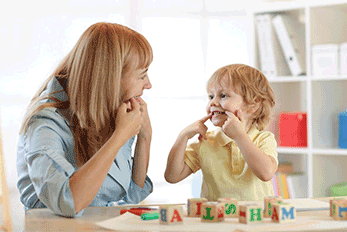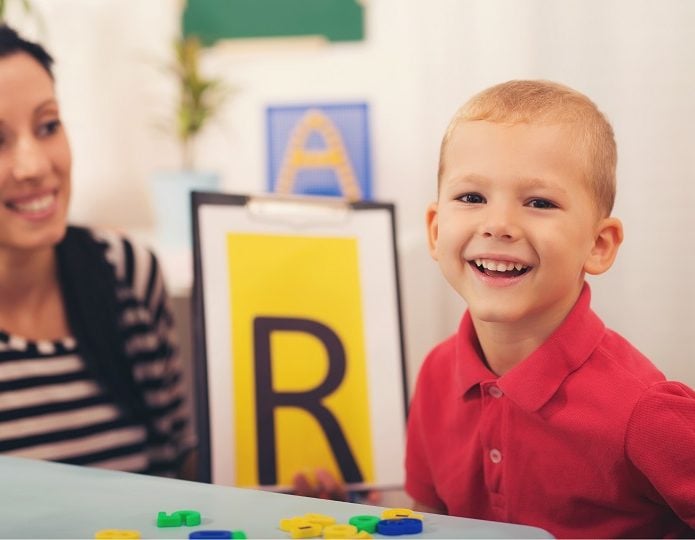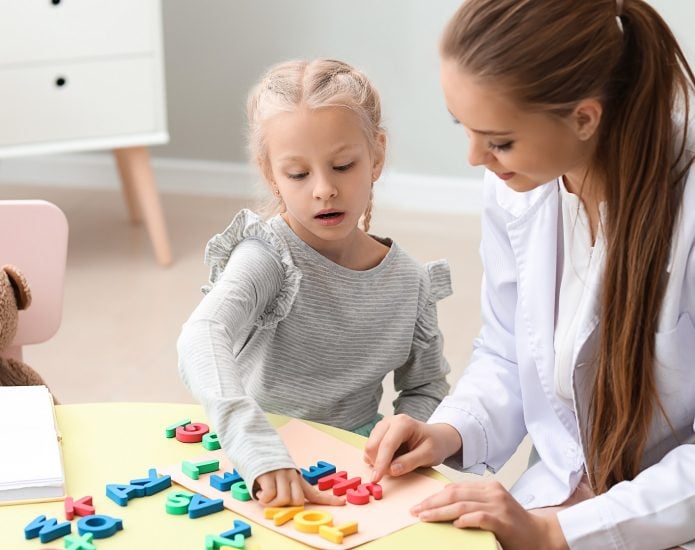
Speech and language development is a critical step in nurturing the foundation of communication, self-expression and literacy. Children develop speech and language skills at vastly different rates, and sometimes this can leave parents worried about their own child’s development, particularly if they seem to be speaking less, mispronouncing words or not being as fluent as their same-aged peers. Parents can often be left wondering whether or not they should be seeking professional support for their child.
Speech vs Language
Firstly, it is important to differentiate between the two terms ‘speech’ and ‘language’. Speech refers to the actual sounds made through spoken word or oral expression. This is the way the child vocalises their sounds and pronounces their words (articulation, voice and fluency). Language, however, refers to the ability of the child to both understand and express language. The child’s understanding of language is used to communicate through the words they choose to share ideas or to get what they want. This understanding also effects the way they interpret and translate instructions from others. Speech and language both have a profound effect on a child’s learning, behaviour, social interaction, academic success and ability to communicate.
For worried parents, a good place to gauge your concern is by familiarising yourself with the ‘typical’ milestones for speech and language development for your child’s age group. It is vital to remember, however, there is a wide range of normal in regards to when your child will master the production of different sounds or the understanding of rules regarding language. The developmental milestones account for a wide range of differences between children who may be at different levels, but both still fall within the normal range. It may also be important to note that girls typically develop earlier in speech than boys do. This doesn’t mean that boys are delayed, but can often develop later within the expected range.
What are the Milestones for Speech Sound Development?
According to Speech Pathology Australia, when a child is talking to an unfamiliar listener (someone who doesn’t speak with them regularly eg. shopkeeper, bus driver etc), they should be able to understand them:
- At 1 year of age, 25% of the time.
- At 2 years of age, 50% of the time.
- At 3 years of age, 75% of the time.
- At 4 years of age, 100% of the time.
By the time children start their first year of school, they should be easily understood all of the time but still might have trouble with some sounds like ‘r’ and ‘th’.
The sounds that most children should be able to say according to age:
2-3 years
p, b, m, d, n, h, t, k, g, w, ng, f, y
4 years
l, j, ch, s, v, sh, z
5 years
r, zh, th, (voiced- when vocal cord vibrates like in words then, thy, that, breathe)
6 years
th (voiceless when vocal cords don’t vibrate like in words thing, think, thigh)
What are the Milestones for Language Development?
Speech Pathology Australia suggest the following milestones for each age group:
1 year
By the age of 1, children should respond to their name, understand around 10 words, communicate using a combination of gestures (eg. pointing, arms up), sounds (like babble) and a few words, and copy noises that adults make.
18 months
By 18 months, children should be able to understand around 50 words, follow a one-part simple instruction (eg. ‘throw the ball’), point to familiar objects or pictures in books (eg. ball, train, girl), say between 5-20 single words (but still might be hard to understand) and name some body parts (eg. eyes, nose).
2 years
By the age of 2, children should be able to follow two-part simple instructions eg. ‘give me the car and the bear’, understand ‘what’ and ‘where’ questions, say 50+ single words and start to put 2 words together (eg. daddy go, mummy up), use ‘my’ and ‘mine’.
3 years
By the age of 3, children should be able to follow two-part more complex instructions eg. ‘give me the car and throw the ball’, understand ‘what’, ‘where’ and ‘who’ questions, start to have short conversations and use -ed on the end of words (eg. he goed over there).
4 years
By the age of 4, children should be able to understand ‘wh’ questions especially about stories that they’ve just heard, make longer sentences with words like ‘and’ , ‘because’, describe events that have happened recently, ask lots of questions, use more personal words like ‘me’, ‘you’, ‘he’, ‘she’, and start to use negatives eg. ‘no’, ‘can’t’, ‘don’t’, start to understand some numbers and count to 5 and use some colour words.
5 years
By 5 years of age, children should be able follow three-part instructions (eg. get your shoes, put them near the door and give me your bag), understand some words related to time eg. ‘before’, ‘after’, ‘later’, start recognising some letters and sounds, tell short simple stories (eg. the plot of a movie/book, what they did on the weekend) that have a beginning, middle and end, use past tense and future tense correctly (eg. I ate, I will eat)
Signs of Speech and Language Difficulties
Along with not meeting the age appropriate milestones, some other indicators that your child may be experiencing difficulty with speech or language:
- Most people, including yourself have difficulty understanding them
- They have trouble communicating and understanding others
- Your child has a smaller vocabulary than same age peers
- They have frequent tantrums and arguments with others due to misunderstandings
- People think your child is younger because of the way they speak
- They have overly slow speech
- Your child stutters “I want, I want, I want the ball” or “p-p-please”
- They have difficulty answering questions from others
- Your child gets teased by others because of the way they talk
- They struggle with reading, writing and/or preliteracy skills
- Your child has hearing problems
- They have been diagnosed with auditory processing disorder, autism spectrum disorder or a developmental delay.
How Can I Help my Child with Their Speech and Language?
- Role model the correct way to speak instead of immediately criticising their mistakes. If children are constantly corrected, especially in front of others, they can lose self-confidence and shy away from speaking altogether
For example, if your child says “I goed to the beach today”, you can just reply with “Oh, you went to the beach today. How was it?” This way you are still role modelling the correct way to say the sentence, and also showing interest in what they have to say without judgement.
- Show more interest in what they are saying rather than how they are saying it
- Praise your child when they tell you something.
- Speak face to face with your child so they can watch how your face, mouth, lips and tongue move when you speak
- Encourage and support your child to speak for themselves during outings eg. when making a purchase, saying thank-you to adults, buying a movie ticket or asking for help.
- Support your child to have daily conversations with a variety of different people
- Read many different types of books and have conversations about the characters, plot or message. Ask different types of questions such as ‘where’, ‘who’, ‘what’, ‘why’.
- Use singing and nursery rhymes to encourage imitation of sounds
- Encourage your child to ask questions when they don’t understand
What Should I do if I think my Child Needs Support with Speech or Language?
If you have any concerns about your child’s speech or language development, it is best to follow your instincts and seek support as soon as possible. Early intervention can make a dramatic difference in ensuring a positive outcome to their future success at school, work, relationships and life. If parents decide to wait and see if they grow out of it, it can inadvertently make the situation worse and put the child at risk of slower progression with reading and writing, poor academic achievement and poor social interactions and relationships
You can get advice from your GP or child health nurse, who can refer your child for a speech pathology assessment. This assessment will give you more information on their strengths and weaknesses and whether intervention is recommended. If your child does need intervention, there is some fee relief available through Medicare (see your GP for more info) or private health insurance providers.
Early recognition and treatment for speech and language delays is by far the most successful approach in ensuring your child can communicate effectively. With the assistance of a speech pathologist and the support of loving and patient adults in their life, children can develop over time the necessary speech, language and communication skills needed for future success.




